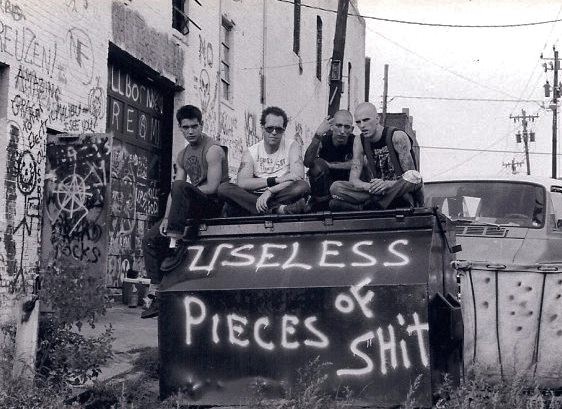In 1984, the local manic-punk band Useless Pieces of Shit became the first music group to be banned from the University of Arizona and inadvertently paved the way for the local hardcore music scene in Tucson today.
On Sept. 27, UPS played for an “Eat to the Beat” concert in the UA Cellar, a series of lunchtime concerts held by the Student Union Activities Board at the time. Educational institutions were not the band’s usual venue, but the DIY members of UPS “lived under the philosophy that any press was good press”, according to then-guitarist Slug Useless.
According to an article published by the Daily Wildcat, about 200 people attended the concert — already cutting close to the Cellar’s capacity for 250 people — and a good amount of them were students from nearby Tucson High School, who had cut class to attend, the article read.
RELATED: Theater Review: Sugar, spice and pies that are nice
“Tucson High School wasn’t entirely too happy with us,” said vocalist Lenny Mental, now a tattoo artist at Sacred Art Tattoo Studio in Tucson and a vocalist for The Besmirchers. “All these kids just didn’t show up for class.”
UPS gained a steady following among high school students, particularly those from THS, thanks to its convenient proximity to Historic Fourth Avenue and the emerging punk-rock scene on those streets.
This crowd of fans at the concert were blamed for the ensuing debacle — what amounted to a food fight. Food was thrown, and furniture was moved, but no actual damage had been done to the property. Nonetheless, the SUAB unanimously moved to ban UPS and their fans from the premises.
“Of all the bands that played there, like Black Flag and The Misfits, UPS was the only one to ever be banned,” Lenny Mental said. “It was really blown out of proportion. Nothing really happened, it was all in good fun.”
Following the self-proclaimed “23 minutes of terror,” UPS wound up in a few articles by the Daily Wildcat and quickly gained notoriety for their intense live shows and raving fans.
“It freaked everyone out, because all these kids were slam dancing. The Arizona Daily Wildcat wrote a bunch of stuff about us, and it created a big stir,” said Slug Useless, who was a co-founder of UPS and revived Disillusion Music Label. “It was just different from what everyone was used to. Tucson was always very straight, and our strangeness seemed threatening.”
That was just the beginning of their true fame, but it was also the beginning of the end for the short-lived band, Slug Useless said.
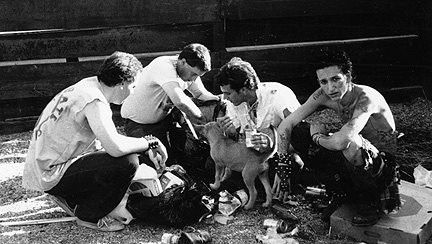
“That show put UPS on the map, but ironically, that ‘bad boy’ image that we created, which really was just a fabricated thing, ended up hurting us in the long run,” Slug Useless said. “We couldn’t get shows at any of the clubs in Tucson. People thought we were going to come and wreck the place, which really wasn’t the case at all.”
UPS was founded during a turning point in music, when punk rock was still new, exciting and misunderstood.
“In the early ‘80s, there was something in the air that was just happening all over, little music scenes popped up all over the country,” UPS vocalist Sleepy Pieces said. “The thing that always astonishes me to this day about Tucson is how many of the bands were and are really good.”
Tucson is not commonly associated with American hardcore, but contrary to that assumption, Tucson was a breeding ground for punk-rock music, the likes of which were unparalleled across the country.
The Tucson music scene was exclusively cover bands at clubs for a long time, but during the punk-rock emergence, Tucson’s Fourth Avenue was the first stop on any touring band going east from California.
RELATED: The UA School of Art makes its way to the Tucson Festival of Books
The Backstage, a box-like punk rock club where the present-day Tucson Thrift Shop stands, brought in major bands like Black Flag and The Ramones, but there wasn’t a local scene until after it burned down in 1982.
With nowhere for major alternative bands to play, Tucson was left to its own devices and made way for a punk-rock scene. Tucson Hardcore — affectionately acronymed THC — was a ragtag underground organization of punk rockers and thrashers who collectively worked a hodge-podge of wild desert concerts and backyard house parties.
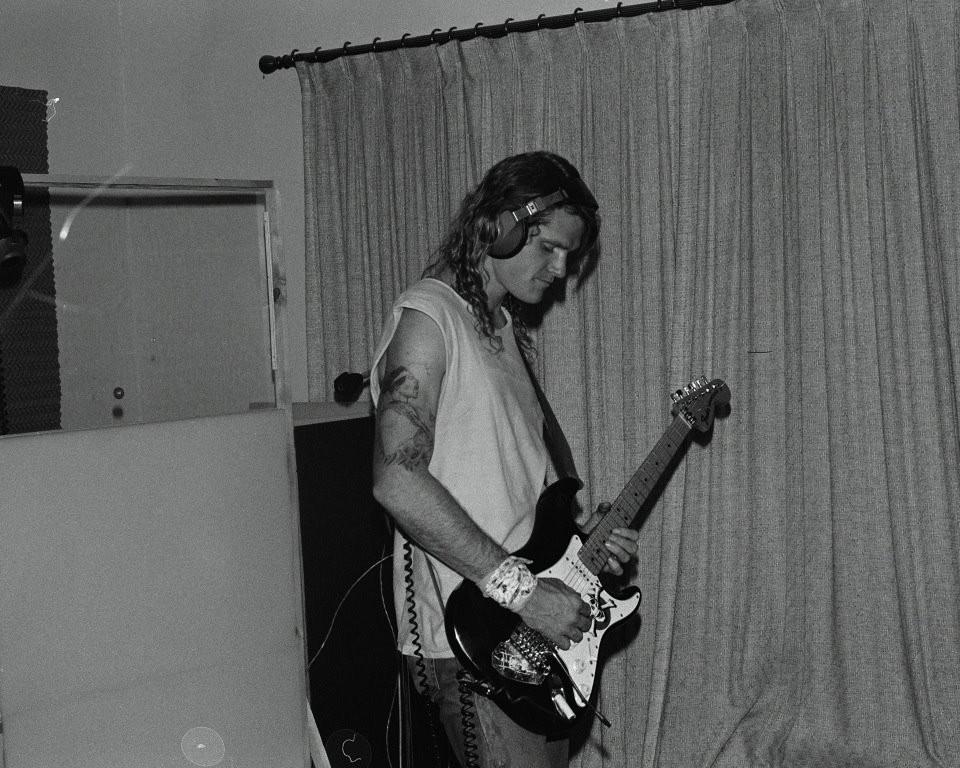
The dream was not making it in music, according to Slug Useless. It was just making music.
“We realized that no club was going to support us. We did some recruiting to create a scene and it kind of opened up a do-it-yourself mentality,” Slug Useless said.
Then, in September of 1983, UPS was born from the proverbial ashes of two local bands — Civil Death vocalist Lenny Mental and the remaining members of The Corporate Whores. Both bands had tried their hands at wooing the audience members of the Backstage but fell short.
The Corporate Whores members Dr. Blood, Slug Useless and Sludge were not a typical punk band. Their style was louder and more energetic, taking inspiration from heavy industrial noise music. They geared further toward the thrash/hardcore genre. Lenny Mental was a classic punk rocker.
“They weren’t a typical punk band, but I was impressed. They still played fast, they were unusual. They weren’t the greatest musicians at first, but they had great image,” Lenny Mental said.
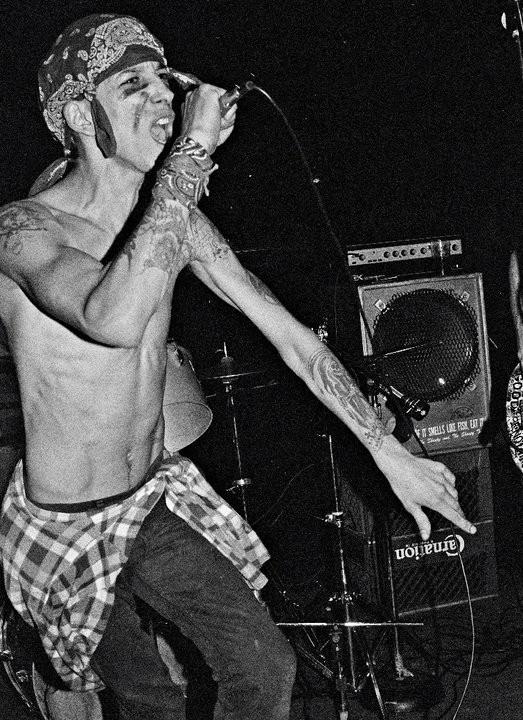
The guys were introverts too, Lenny Mental said, living very co-dependent lives within the same house, outside the realm of straight reality. They dedicated everything they had to music.
“When I first met them, it was them against everybody else,” Lenny Mental said. “They were the kind of people I wanted to start a band with — we were all misfits and rejects.”
Although short-lived, this band of musical misfits were at the forefront of a new and rapidly changing punk rock, both locally and nationally.
UPS released their first demo album, “Ugly in Public,” in 1985, after which they went on their first national tour the summer of the same year. A new lineup went on the “Stupid Punk U.S. Tour” in the fall of 1986, during which all the members got tattoos commemorating the tour — an early instance of tattooing as a punk-rock tradition.
The first full-fledged UPS vinyl album, “Fuck Shit Up,” was released in 1987, and UPS performed on live television.
A second album, titled “It is Written,” was set to release, but the band slowly fell apart. UPS was officially broken up before its release, following Slug Useless’ move to Seattle in 1989.
Their music always stood out, even on national tour, according to Sleepy Pieces. They had a ferocious, energetic and innovative live show, complete with clown masks and plenty of audience interaction.
“While hardcore punk at its core, the music of UPS was anything but standard, three-chord thrash,” Sleepy Pieces said. “There were twists and turns, humor, sarcasm and a joy of the absurd that worked its way into the soup. I remember one person telling me we sounded like a circus on acid.”
All the while, UPS experienced a series of struggles and frequently shifting lineups.
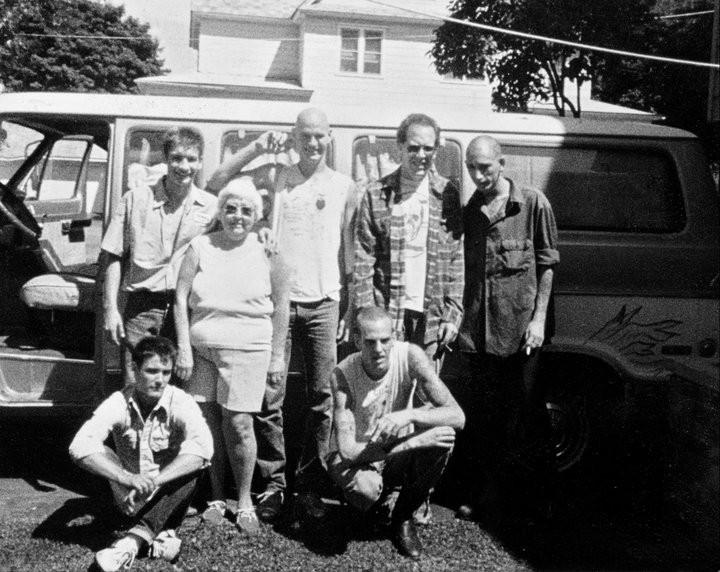
There were several changes of drummers, bassists and lead singers, as members were consistently thrown curveballs in their personal lives. At one point, during their first year, UPS was evicted from their shared house and left without a rehearsal space for several months.
Due to their notorious reputation and social distrust of alternative music, UPS had trouble getting shows.
“It was a lot of work to put on shows because there was a lot of resistance against us. The police would come and shut us down,” Slug Useless said. “People weren’t very supportive of nontraditional music, whereas in Tucson now, people are much more open to the kind of music that plays at those clubs.”
The band’s rebellious image was only exacerbated by local UPS fans, who quickly took to spreading their love by tagging the UPS logo on every available surface in town.
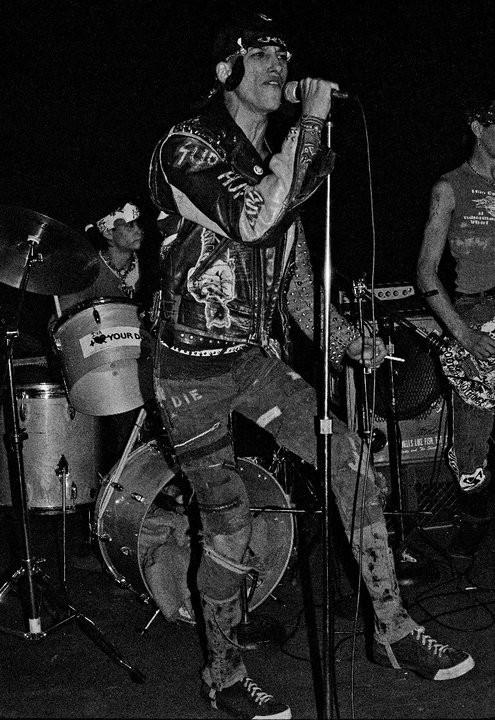
“The spray painting wasn’t us, but the kids that were into us. There was a while there where the UPS moniker was everywhere — and I mean everywhere, on everything,” Lenny Mental said.
According to Lenny Mental, the walls of THS were defaced so many times it caused the band members trouble. It became so popular record stores at the malls found their window backdrops spray painted, which often confused workers.
Slug Useless believes that the tagging had started innocently, was even flattering, but got out of control. Still, he supported the reason behind the cause, if not the action.
“It was never violent, it was just a fuck-you to this white-washed notion of the world people had back then,” Slug Useless said. “It’s still true today that you can get in more trouble for defacing a McDonald’s than for attacking someone, and that sanitized world is all we were trying to go against.”
UPS never gained national fame. These days, not many remember them or how they contributed to the local hardcore music scene today.
Slug Useless, who still writes punk-rock music under Art Vandal, has watched the hardcore music scene evolve nationally. To him, the biggest difference between punk rock then and punk rock now lies in level of raw emotion tied to the genre.
“That pissed-off attitude that punk rock centered around isn’t really happening anymore,” Slug Useless said. “It’s in different music scenes that I don’t know about because I’m not 18 years old and angry as hell anymore.”
However evolved, the punk-rock scene is still around, both nationally and locally. The advent of the internet, streaming and home studios have made music-making more accessible than ever, Slug Useless said.
“I now have a son that has been playing in bands for the past seven or eight years, so it’s been fun to listen to some of the bands that he tells me about when he’s on tour,” Sleepy Pieces said. “The underground punk scene is alive and well nationwide.”
Follow the Daily Wildcat on Twitter



